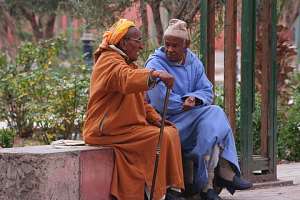
Nairobi, 13 August 2018: Agencies that respond to disasters and emergencies still exclude older people, including those that live with disabilities, according to two new studies by the Humanitarian Policy Group of the Overseas Development Institute focusing on Ethiopia, Kenya, South Sudan and Uganda.
Commissioned by HelpAge International with funding from Age International , the studies uncover experiences of displaced older people and the role and vulnerabilities of drought-affected older people in East Africa . They show that neglect is happening against a background of eroded social cohesion after years of conflicts and repeated, long droughts in East Africa, which have increasingly driven rural families to either urban areas or displacement camps.
Older people tend to be less physically mobile than the wider population, and often live with chronic illnesses and disabilities. When they are affected by disasters or conflict, these vulnerabilities are exacerbated.
Droughts lead to a scarcity of appropriate food for older people, it can leave them weak and reduce their mobility and they increase their dependence on others.
During conflict, older people may struggle to seek refuge, which means they make up a large proportion of those left behind. Accessing information, services and assistance is often difficult and they are at greater risk of psychological abuse, physical and sexual violence, neglect and theft.
"Older people with disabilities reported receiving less support from their families during displacement as resources were scarce and families grew tired of caring for them," according to the study Older people in displacement: falling through the cracks of emergency responses. This loss of “power, dignity and respect” can have a harmful impact on older people’s psychological health.
Dr Prafulla Mishra, Africa Regional Director at HelpAge, said: "Continued conflicts and the frequent cycle of droughts in East Africa dismantle communities’ power and support structures, breaking down older people's traditional positions of influence and power within communities. As younger people migrate to find work in urban areas or pasture further afield, those left in their villages face further isolation and neglect.
"While governments in East Africa, in particular Kenya and Ethiopia, are increasingly developing social protection policies, universal pension systems and other safety nets that build the resilience of older people, humanitarian organisations are not responding fast enough."
Older people have unique skills, experiences and a lifetime of knowledge that are important for their roles within families, communities and wider society.
The women are often caregivers responsible for raising grandchildren, supporting households through domestic chores and contributing economically if they are able. Older men, meanwhile, play a key role in decision-making and mediating disputes.
Older people’s roles continue to a certain extent during droughts, but they are weakened as communities break up. Humanitarian agencies should recognise these important roles as mediators and carers, and utilise the invaluable knowledge older people have from experiencing prior disasters. This could strengthen older people’s role in the community during emergencies, rather than see it weaken, and improve the overall quality of the programming.
The authors of the studies Dr Fiona Samuels and Dr Veronique Barbelet concluded that the "humanitarian organisations’ response often fail to counteract the detrimental impact on older people in declining social cohesion as a result of displacement due to conflicts or drought."
Dr Prafulla added: "Climate change is likely to increase the frequency and severity of natural and human disasters. As these crises take hold, it is important humanitarian action not only responds to the specific needs and vulnerabilities of older people, but also recognises and builds on their capacities to contribute to humanitarian preparedness and response," said Dr Prafulla.
The two studies explore how actors involved in emergency crises can better include older men and women in their responses. Among the recommendations, the authors suggest:
- programmes build on the roles and capacities of older people, utilising their positions as mediators within communities, their significance in decision-making, and their experience in managing previous disasters, such as droughts
- integrating older people’s inclusion into wider work on gender and protection
- humanitarian agencies adopt the policies and practices of the Humanitarian inclusion standards for older people and people with disabilities.




 Meta releases new version of conversational AI across its platforms
Meta releases new version of conversational AI across its platforms
 Cape Town named Africa’s Best Airport 2024 by Skytrax
Cape Town named Africa’s Best Airport 2024 by Skytrax
 Bono East: Four injured after hearse transporting corpse crashes into a truck
Bono East: Four injured after hearse transporting corpse crashes into a truck
 ‘Be courageous, find your voice to defend our democracy’ — Sam Jonah urges journ...
‘Be courageous, find your voice to defend our democracy’ — Sam Jonah urges journ...
 Exodus of doctors, nurses and teachers have worsened because of unserious Akufo-...
Exodus of doctors, nurses and teachers have worsened because of unserious Akufo-...
 2024 election: Avoid insults, cutting down people in search of power – National ...
2024 election: Avoid insults, cutting down people in search of power – National ...
 ‘You passed through the back door but congratulations’ — Atubiga on Prof Jane Na...
‘You passed through the back door but congratulations’ — Atubiga on Prof Jane Na...
 Government’s $21.1 billion added to the stock of public debt has been spent judi...
Government’s $21.1 billion added to the stock of public debt has been spent judi...
 Akufo-Addo will soon relocate Mahama’s Ridge Hospital to Kumasi for recommission...
Akufo-Addo will soon relocate Mahama’s Ridge Hospital to Kumasi for recommission...
 We must not compromise on our defence of national interest; this is the time to ...
We must not compromise on our defence of national interest; this is the time to ...
